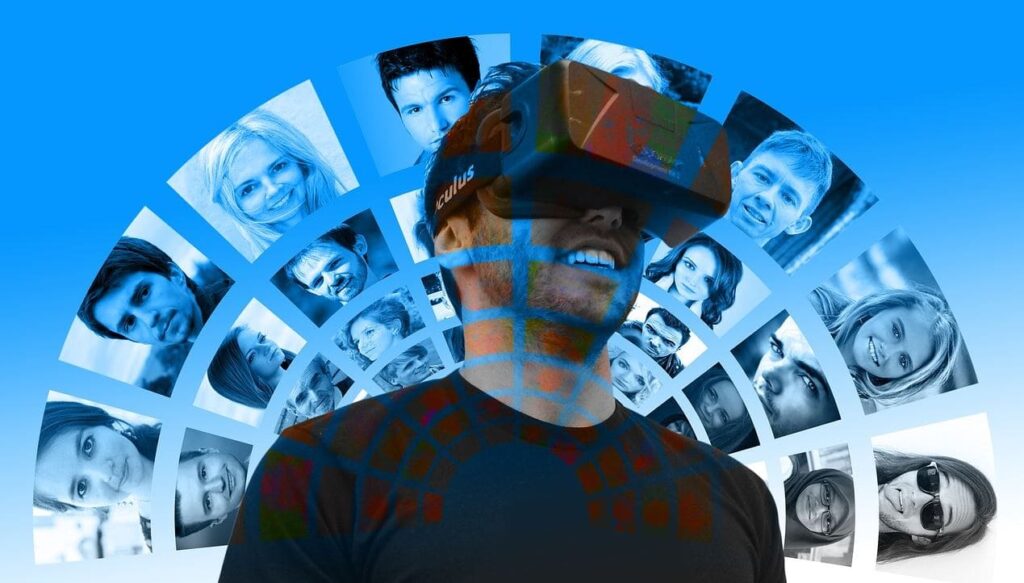Introduction
Virtual reality can revolutionize social media by transforming itself to increase the demand for online platforms. The technology can impact the Internet community directly by improving multiuser-multiuser capabilities, which links to an uptrend in its usability. Virtual reality potentially impacts social media by making the platforms sophisticated business tools, especially for advertisement, which increases its application in marketing activities. The technology can also impact social media by improving the platform’s ability to host external applications. Virtual reality can increase the value of social media by improving its multiuser-multiuser capabilities, increasing demand for business operations, and the ability to host external applications.
Improved Multiuser-Multiuser Capabilities
Virtual reality increases social media’s multiuser capabilities, leading to a revolution in the online industry. For example, the technology can enable the integration of virtual-focused interfaces to the existing content creation tools on social media, improving its usability by providing more interactive multiuser capabilities (Tea et al. 2021, p. 1). The advancement of such platforms through virtual reality will help to address the demand for technological content, improving the value of social media. Thus, integrating virtual reality into social media creates new possibilities for its usage, leading to the multi-usability of such platforms.

Increased Demand for Business Operations
Virtual reality used in the social media field makes the platforms sophisticated business hubs. For example, its integration into social media allows for creating and hosting interactive advertisement posts, increasing its demand among businesses in the digital era (Dwivedi 2022, p. 12). Virtual reality-powered advertisements enable social media to project products and services in an improved brand exposure approach, fostering its popularity as an effective marketing tool in modern businesses. As such, incorporating virtual reality in social media promotes its usefulness in organizations, increasing its demand for business operations.
Hosting of External Applications
The virtual reality technology impacts social media by increasing its ability to host other applications. For example, social media allows the playing of different online games, and the integration of virtual reality improves the experiences of users to new levels, making it attract more attention due to the likability of the technology’s graphics across different population segments (Kari & Kosa 2023, p. 1). The technology can improve the usability of social media by allowing the smooth running of such games, which are growing in popularity worldwide. Therefore, virtual reality can improve social media platforms’ gaming aspect and increase their capabilities to host other applications.
Conclusion
Integrating the virtual reality technology into social media platforms improves its multiuser capabilities, demand for business operations, and ability to host other external applications, providing a positive transformation. The technology has the potential to revolutionize social media by making it a more dynamic social platform with increased multiuser capabilities. The revolution can transform social media into a sophisticated business tool by enabling the creation of detailed advertisement posts, leading to increased demand for such platforms to perform business activities. Virtual reality can also impact social media by increasing its ability to host external apps, including enhanced graphic games, which increases its value and popularity. Therefore, virtual reality can improve multiuser-multiuser abilities, business value, and external app hosting, increasing the platform’s demands.
Reference List
Dwivedi, YK 2022, ‘Metaverse beyond the hype: Multidisciplinary perspectives on emerging challenges, opportunities, and agenda for research, practice and policy’, International Journal of Information Management, vol. 66, no. 66, pp. 1–55, viewed 9 July 2023, DOI: 10.1016/j.ijinfomgt.2022.102542.
Kari, T & Kosa, M 2023, ‘Acceptance and use of virtual reality games: An extension of HMSAM’, Virtual Reality, pp. 1–21, viewed 9 July 2023, DOI: 10.1007/s10055-023-00749-4.
Tea, S, Panuwatwanich, K, Ruthankoon, R & Kaewmoracharoen, M 2021, ‘Multiuser-multiuser immersive virtual reality application for real-time remote collaboration to enhance design review process in the social distancing era’, Journal of Engineering, Design and Technology, vol. 20, no. 1, pp. 1–2, viewed 9 July 2023, DOI: 10.1108/jedt-12-2020-0500.


